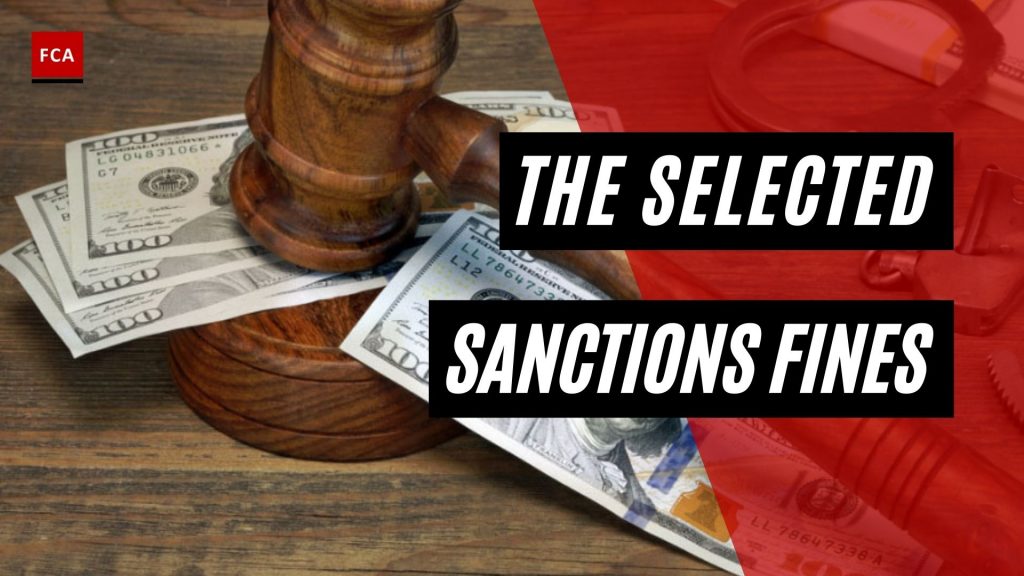The selected sanctions fines. Penalties for sanctions violations can be huge in terms of fines, loss of business, and reputational damage. In this lesson, we will look at a handful of cases where US authorities have been particularly rigorous in prosecuting banks in more or less the last decade or so.

The Selected Sanctions Fines
The current record holder of the highest sanctions violations to date is the French bank BNP Paribas. BNP agreed to pay almost 8.9 billion US-dollar in penalties and pled guilty to settle charges it concealed roughly 8.8 billion US-dollar of transactions with countries like Sudan, Iran, and Cuba.
The French government has protested the penalty, saying it was too high, and President Francois Hollande raised the issue personally with President Obama in early June. But in the end, the Justice Department said BNP did not appropriately cooperate with U.S. authorities, necessitating a high fine.
Largest Sanctions Fine
The previous record-holder for the largest sanctions fine was HSBC, which in December 2012 paid nearly 1.3 billion US-Dollar as part of a deferred prosecution agreement. HSBC was accused of conducting transactions on behalf of customers in Cuba, Iran, Libya, Sudan, and Burma, all of which were on the sanctions list. Federal authorities also said HSBC allegedly helped to launder around 881 million US-dollar in drug proceeds through the U.S. financial system.
Also, in 2021, ING was assessed with a 619 million US-dollar penalty for allegedly moving billions of dollars on behalf of sanctioned Cuban and Iranian entities. Federal authorities said the bank helped move 2 billion US-dollar worth of transactions on behalf of those entities.
Credit Suisse
In December of 2009, Credit Suisse paid 536 million US-dollar for transactions on behalf of customers from Iran and Sudan. Among other claims, law enforcement officials said that Credit Suisse trained its Iranian clients to falsify wire transfers so that those messages would not be hampered by filters at U.S. financial institutions. Credit Suisse more recently agreed to a 2.6 billion US-dollar settlement over tax fraud charges.
Similarly, Lloyds TSB Bank was hit with a 350 million US-dollar fine in January 2009 related to transactions with Iranian customers. Law enforcement officials said the transactions allowed more than 350 million US-dollar to be processed by U.S. correspondent banks that otherwise might have been blocked or rejected.
Sanctions In Law
Sanctions are penalties or other means of enforcement used to provide incentives for compliance with the law, or with rules and regulations, according to law and legal definition. Criminal sanctions can include severe punishment, such as corporal or capital punishment, incarceration, or heavy fines. In civil law, sanctions are typically monetary fines levied against a party to a lawsuit or their attorney for violating procedural rules or abusing the judicial process. In a civil lawsuit, the most severe sanction is the involuntary dismissal, with prejudice, of a complaining party’s cause of action or the responding party’s answer.
Final Thoughts
Economic sanctions are penalties imposed on a country, its officials, or private citizens as punishment or to provide disincentives for the targeted policies and actions. Travel bans and export restrictions, as well as trade embargoes and asset seizures, are examples of economic sanctions. Such sanctions, by definition, apply to parties who are not easily subject to law enforcement by the sanctioning jurisdiction.
Economic sanctions are a policy tool that, short of military force, can be used to punish or deter objectionable behavior. They are widely applicable beyond the borders of the sanctioning country and can be costly to their targets in an era of increased global trade and economic interdependence. Economic sanctions can also be a blunt and ineffective policy tool, imposing insufficient and disproportionate costs on the targeted governments and their most vulnerable populations.








